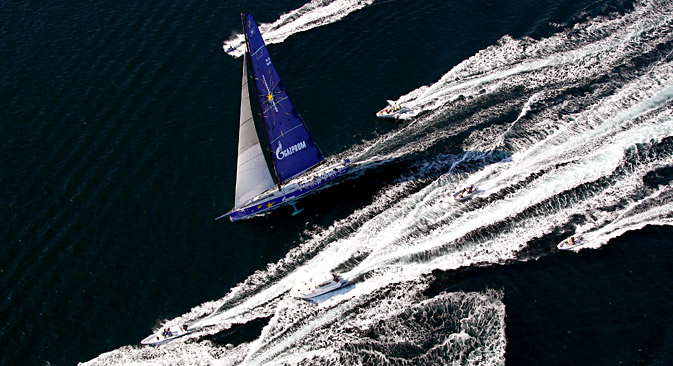
Nord Stream-2 is a gas pipeline project linking Russia and Germany via the Baltic Sea. Source: Reuters
ReutersRussia’s gas giant Gazprom has signed a binding shareholders’ agreement with European energy companies for the construction of the Nord Stream-2 pipeline from Russia to Germany. The landmark deal was inked at the Eastern Economic Forum, held in Russia’s far eastern city of Vladivostok on Sept. 3-5.
Gazprom will own a controlling stake, while Germany’s E.ON and BASF/Wintershall, Austria’s OMV and Royal Dutch Shell will receive 10 percent each, while France’s Engie will receive 9 percent.
In itself, the signing of the shareholders’ agreement for Nord Stream-2 is already evidence that the EU, as before, has no common position either on relations with Gazprom as a whole or on today’s most pressing issue – that of gas transit through Ukraine.
Nord Stream-2 is a gas pipeline project linking Russia and Germany via the Baltic Sea, with a capacity of 55 billion cubic meters. It is expected that the route on the seabed, as well as the entry point of the gas transportation system in Greifswald, Germany, will be the same as those of the first Nord Stream pipeline, launched in 2011.
The largest power companies in the UK, France, Germany and Austria signed the project, whose implementation will minimize the transit of gas through Ukraine, which all these states continue to support politically. However, the agreement is contrary to the position of Brussels; according to Vice-President of the European Commission Maroš Šefčovič, there is no need for any gas pipelines bypassing Ukraine.
“Germany believes that Ukraine should be supported, but the path to democracy and reform is very long, and we are losing time; the Ukrainian gas transportation system must be modernized, but no one is ready to invest,” said Alexander Rahr, research director of the German-Russian Forum, adding that plans for Nord Stream-2 do not violate EU law, including the Third Energy Package.
The shareholders’ agreement is a serious blow to the south-eastern countries of the EU, which were prevented by the United States and the European Commission last year from building the South Stream pipeline, intended to supply Russian gas to Southeast Europe via an undersea pipeline and a distribution hub in Turkey.
Now it is proposed to build a gas pipeline which, with a capacity of 55 billion cubic meters a year, which will bring billions of dollars in transit fees not to Bulgaria and Hungary, but to Germany and the Czech Republic. In addition, virtually all Russian gas will reach Europe through Germany, providing German gas pipeline companies with stable income for decades.
“The participants of South Stream – Bulgaria, Greece and Italy – are the countries that do not have enough weight to make decisions contrary to the general political line, but Germany will be able to,” said Fyodor Lukyanov, head of the Council for Foreign and Defense Policy, an independent Moscow-based think tank.
In his view, Berlin is still committed to the diversification of gas supplies and reducing dependence on Russia, and will continue to support Ukraine politically, but in this case it went for a pragmatic solution.
Kommersant’s sources agree that the position of the United States regarding the deal will be very important.
“Talks are underway with the U.S. on the Trans-Atlantic Free Trade Agreement (TAFTA) – very important for the EU and Germany – with Washington offering to supply Europe with its gas,” says Rahr, adding that “the U.S. opposed the first Nord Stream as well, but it was still built.”
According to Lukyanov, the United States can do little – Germany’s eastern policies are half-a-century-old, and “Germany has always had it its own way when it comes to its direct interests.”
All rights reserved by Rossiyskaya Gazeta.
Subscribe
to our newsletter!
Get the week's best stories straight to your inbox